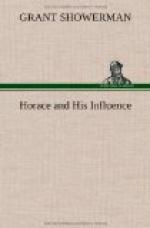“S_trutted and fretted his hour
upon the stage_,
A_nd then was heard no more_.”
It is in relief against a background such as this that Horace’s works should be read,—the Satires, published in 35 and 30, which the poet himself calls Sermones, “Conversations,” “Talks,” or Causeries; the collection of lyrics called Epodes, in 29; three books of Odes in 23; a book of Epistles, or further Causeries, in 20; the Secular Hymn in 17; a second book of Epistles in 14; a fourth book of Odes in 13; and a final Epistle, On the Art of Poetry, at a later and uncertain date.
It is above all against such a background that Horace’s invocation to Fortune should be read:
G_oddess, at lovely Antium is thy shrine_:
R_eady art thou to raise with grace divine_
O_ur mortal frame from lowliest dust of
earth_,
O_r turn triumph to funeral for thy mirth_;
or that other expression of the inscrutable uncertainty of the human lot:
F_ortune, whose joy is e’er our
woe and shame_,
W_ith hard persistence plays her mocking
game_;
B_estowing favors all inconstantly_,
K_indly to others now, and now to me_.
W_ith me, I praise her; if her wings she
lift_
T_o leave me, I resign her every gift_,
A_nd, cloaked about in my own virtue’s
pride_,
W_ed honest poverty, the dowerless bride_.
Horace is not here the idle singer of an empty day. His utterance may be a universal, but in the light of history it is no commonplace. It is the eloquent record of the life of Rome in an age which for intensity is unparalleled in the annals of the ancient world.
And yet men may live a longer span of years than fell to the lot of Horace, and in times no less pregnant with event, and still fail to come into really close contact with life. Horace’s experience was comprehensive, and touched the life of his generation at many points. He was born in a little country town in a province distant from the capital. His father, at one time a slave, and always of humble calling, was a man of independent spirit, robust sense, and excellent character, whose constant and intimate companionship left everlasting gratitude in the heart of the son. He provided for the little Horace’s education at first among the sons of the “great” centurions who constituted the society of the garrison-town of Venusia, afterwards ambitiously took him to Rome to acquire even the accomplishments usual among the sons of senators, and finally sent him to Athens, garner of wisdom of the ages, where the learning of the past was constantly made to live again by masters with the quick Athenian spirit of telling or hearing new things.




